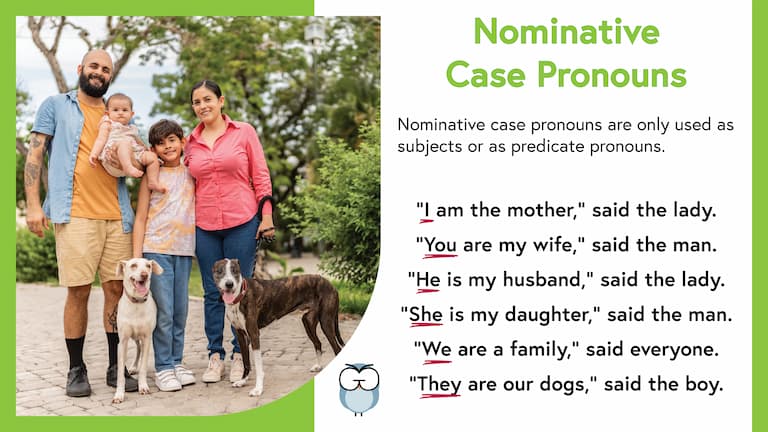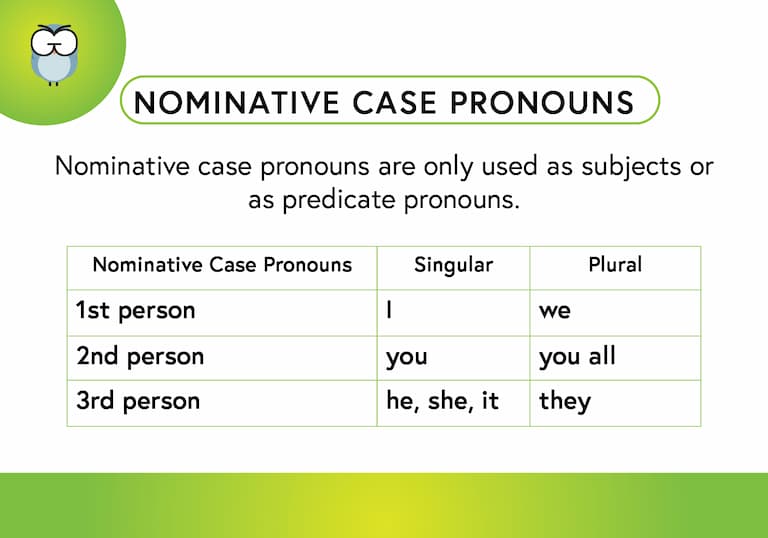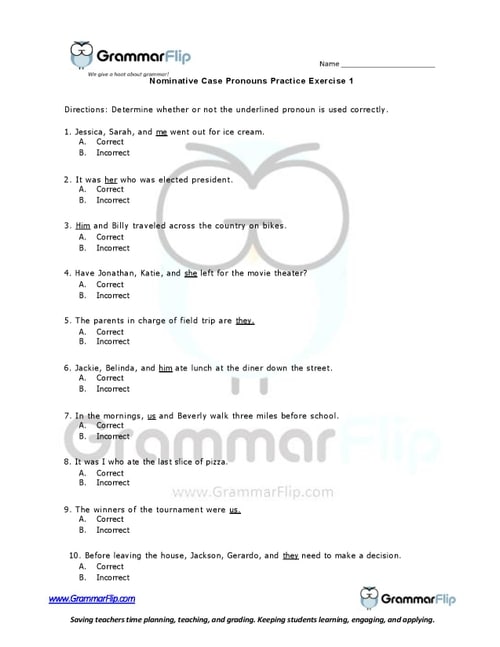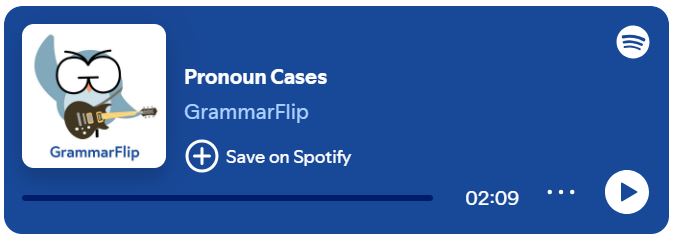What is a Nominative Case Pronoun?
Nominative case pronouns are pronouns that are only used as subjects or as predicate pronouns.
Some examples of nominative case pronouns would be the following:
I love jazz music.
She is performing in the talent show.
They are meeting us at the restaurant.
The host of the premiere is he.
Long-Form Videos: Nominative Case Pronouns
Long-form instructional video lessons allow students to engage with grammar concepts in more depth and detail.
This format provides students with a stronger foundation and a more comprehensive understanding of nominative case pronouns.
Short-Form Videos: Nominative Case Pronouns
Short-form videos are an excellent way to review grammar concepts. Our two-minute instructional videos help students review the concept of nominative case pronouns to further solidify their understanding.
Memorable Images: Nominative Case Pronouns

The use of images to connect visual cues with concepts makes it simpler for students to grasp and remember key ideas. GrammarFlip’s memorable images create visual associations that make nominative case pronouns more engaging and easier to retain.
Definition Cards: Nominative Case Pronouns
Definition cards reinforce grammar concepts by providing clear and concise explanations that students can easily reference for quick review and better retention. GrammarFlip’s definintion cards help students review the concept of nominative case pronouns to further solidify their understanding.

Music: Nominative Case Pronouns
Learn grammar concepts through music! The unique verses and catchy chorus in our “Pronoun Cases Song” will help your students further understand nominative case pronouns. Listen for yourself and see if you don’t walk away singing this song to yourself!
Listen to GrammarFlip Music via Spotify, Apple, or Amazon!
Music Videos: Nominative Case Pronouns
Music videos make grammar concepts more engaging and memorable by combining rhythm, visuals, and repetition to reinforce learning. GrammarFlip’s music videos help students retain the concept of nominative case pronouns more effectively while making the learning process fun and interactive.
Why You Should Use Nominative Case Pronouns in Your Writing
Just like all pronouns, nominative case pronouns should be used to avoid repetition and redundancy. Notice anything repetitive in the following sentence?
After Shane ate breakfast, Shane went to the store because Shane didn’t have any bacon.
Pretty repetitive, right? Now, take a look at this one:
After he ate breakfast, Shane went to the store because he didn’t have any bacon.
There’s a much better flow to the writing, and the word “Shane” is only used once. We used the nominative case pronoun “he” to avoid any repetition or redundancy.
Keep in mind that these are nominative case pronouns (as opposed to objective case pronouns or possessive case pronouns). Nominative case pronouns can only be used as the subject of a clause or as predicate pronouns (a type of subject complement). Click on the links above if you need a reminder of the other pronoun types.
Download a Free Worksheet on Nominative Case Pronouns!
Click the image below to download your free worksheet on nominative case pronouns!

Need something more than just worksheets for your grammar instruction?
Explore More GrammarFlip Lessons!
Parts of Speech lessons provide the building blocks of grammar. GrammarFlip covers these topics in detail to ensure a solid foundation is built. First time learners and students seeking to review the parts of speech can both benefit from the instructional videos and slide show reviews.
Parts of the Sentence lessons are critical for understanding how the parts of speech function in language construction. From the basic to the advanced, these lessons will cover a wide range of grammar topics that can be used in any grade level or classroom.
Mechanics and Usage lessons equip students with the necessary skills to communicate clearly to all audiences. With a focus on the application of these concepts in student writing, these lessons tie together both simple constructions of grammar as well as the more complex such that any age or skill level of student will benefit.



